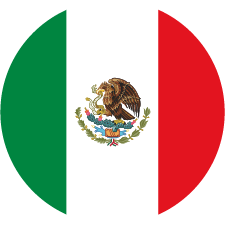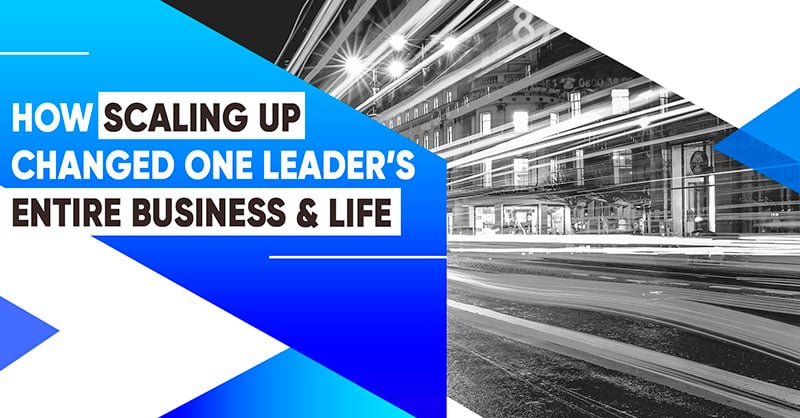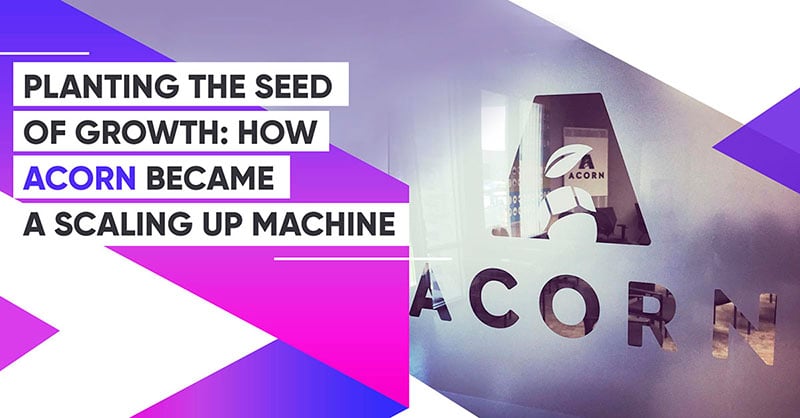Shining Brighter Than Ever: How A Jewellery Company In India Broke Into New Markets
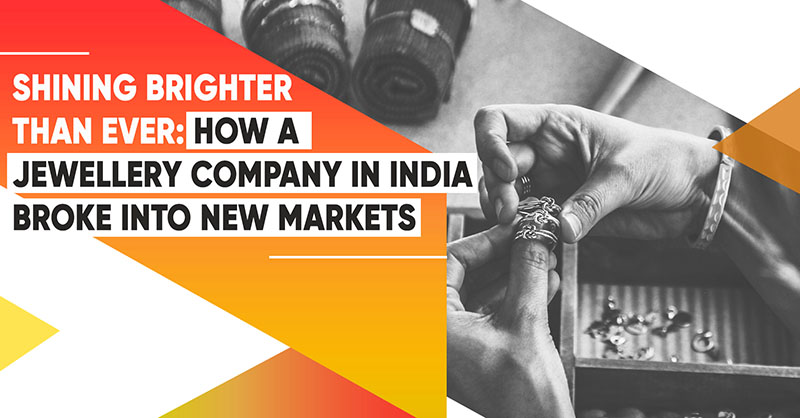
.png?width=240&name=vikram%20(1).png) One success story comes from a client in India, Kiara Jewellery Pte Ltd, which is a jewellery production company based in Mumbai. Although they are part of a larger multinational organization based in France, they have autonomy on business growth decisions to scale their particular part of the company.
One success story comes from a client in India, Kiara Jewellery Pte Ltd, which is a jewellery production company based in Mumbai. Although they are part of a larger multinational organization based in France, they have autonomy on business growth decisions to scale their particular part of the company.I recently chatted with Vikram Bhat, the Managing Director at Kiara Jewellery who heads the manufacturing unit, to see how the Scaling Up methodology has helped them expand their business in the South Asian market and beyond.
Here are some highlights of our conversation.
[Daniel Marcos] How did your journey with the Scaling Up methodology begin?
[Vikram Bhat] Well, Verne Harnish travels to Mumbai almost every year and I started my Scaling Up journey by attending his one-day workshop on the Scaling Up methodology itself. Verne tries to cover as much as possible in available 6-7 hours.
It’s quite a lot to take in, so I actually attended the workshop twice. Of course, I also got myself the book and tried to implement a couple of things. I found the methodology very interesting and was already practicing certain tactics like lean management with my team. So I really resonated with the Scaling Up methodology, because a lot of the things I considered to be the best business practices were aligned with what Verne teaches.
[DM] That’s interesting. So how would you say the Scaling Up methodology helped you with implementing these best business practices?
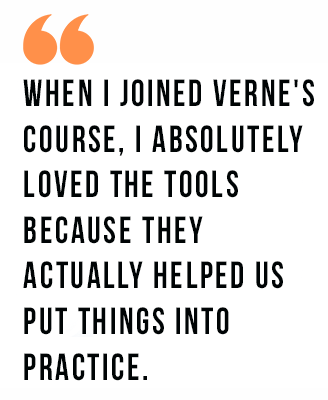 [VB] A lot of other best business practices are high-level concepts, and they don’t really give you a concrete way to adapt and control things as they relate to your specific company. So when I joined Verne's Scaling Up Master Business Course 2.0, I absolutely loved the tools because they actually helped us put things into practice.
[VB] A lot of other best business practices are high-level concepts, and they don’t really give you a concrete way to adapt and control things as they relate to your specific company. So when I joined Verne's Scaling Up Master Business Course 2.0, I absolutely loved the tools because they actually helped us put things into practice.Another thing I loved about the course is how it gives me a real overview of the entire business, and prodded me to look at things with both a short term and long term point of view.
And of course, Verne’s videos in the course are excellent. What was also very good was getting eight weeks of coaching and guidance from a Scaling Up coach.
[DM] Your Scaling Up journey is amazing and covers all the different levels of learning from the book to the in-person workshop and the Master Business Course. Could you share what that learning journey was like?
[VB] Yes. Well, as I progressed from the book to Verne’s workshop and then the Scaling Up Master Business course, I gained a more in-depth analysis into what Verne teaches.
For example, in the Scaling up course, even though the videos are 7-10 minutes, they are pretty intense. I've already seen them multiple times and I feel I keep learning something new every time I watch it. I recommend watching Verne’s videos over and over, because you will still learn something new every time. The videos powerfully capture a lot of insights.
[DM] That's really cool. That's a good feeling, right?
[VB] Yeah, that's great. In fact, earlier this month I attended his workshop in Mumbai again. There’s always something new to learn with Verne. Basically, Scaling Up has kind of given me a methodology which I can apply in the day-to-day operations of my organization.
[DM] Can you get more specific on the kind of problems the Scaling Up course addressed for you?
[VB] Cash is one of them. Verne talks about cash and how to manage cash in a practical way so you can, for example, grow from 20 employees to 130. One of Verne’s tips is you need to understand the effects of growing your employees and keep track of the numbers on a daily basis. So you see, a lot of the concepts he covers can be immediately applied. It’s so practical.
And I like how the course is divided into four areas. Cash is just one of them. The other three are people, execution and strategy. And everything kind of comes together in the course. So it’s very useful.
[DM] So, what was your favorite part of the course?
[VB] For me, the best parts were Verne's videos because he very lucidly and passionately explains the concepts. And you want to really absorb what he says.
And then, of course, the Scaling Up tools, especially the One-Page Strategic Plan (OPSP). Trying to fill in the OPSP takes away all of the clutter in your mind. That one page makes you focus on what really matters and is important for the business.
So I’d say Verne's videos and the OPSP are my two favorite parts of the course. That being said, the one-on-one coaching helped me through very specific questions I had in mind and was the key for me to really implement and finish my toolkit. For example, there were certain parts of the OPSP where I was stuck and that’s where the one-on-one coaching really created a lot of clarity and direction on how to move forward.
[DM] So now that you have these tools to scale up, where do you want Kiara Jewellery to be in five years?
[VB] Sure. Well, because Kiara Jewellery is the production arm of the parent company that’s based in France, I won’t be able to sell anything and grow my business in France itself because it's their home territory. But the rest of the world is open for me.
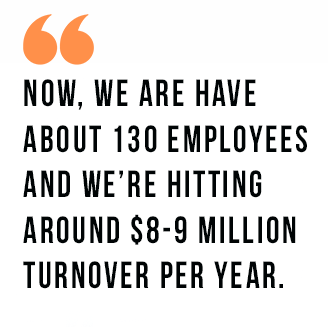
I can choose to double business in any other region or country that I want to. So my executive team and I are using the Scaling Up methodology to manage the entire business development function, from the P&L to the results, to making policies and strategies.
When we first started about a decade ago, we probably had about twenty people. Now, we are have about 130 employees and we’re hitting around $8-9 million turnover per year.
Of course, now we want to grow. Our goal is to double in five years by expanding into new markets. That's our growth strategy that we’re implementing with the Scaling Up methodology.
[DM] How do you think your Scaling Up journey impacts your business?
[VB] The whole Scaling Up methodology, from the seminars to the book and the course, talks about growth strategies. And personally, because of the market conditions we faced in India, business was pretty stagnant for about three years.
We had reached a certain level over the years, but we were stuck at the $8-9 million mark. The Scaling Up Master Business Course 2.0 helped me think in new ways to grow.
This course made me consider going out to new markets and develop the best strategy to do that, as well as come up with ideas of the kind of new products we should get into. So this course was definitely an inspiration for me to think in the new ways.
[DM] So, with the new ways of thinking, what aspect did you start implementing first to grow in new ways?
[VB] So, the first thing that I applied immediately were the meeting rhythms. We have the daily meetings in place now, where we go over what's happening in the company, the keys numbers and where each person is stuck.
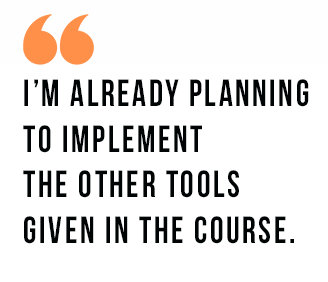
Also, we have a dashboard now, which we use to look at all the important numbers together. And then, as I mentioned earlier, we finished the OPSP. Now that I’m further down the line, I’m really starting to see the importance of the OPSP. It makes you makes you think through a lot of things and really do your homework to scale a business.
As for next steps, well, I’m already planning to implement the other tools given in the course.
[DM] That’s very cool. How did you get your team members to adjust to these new changes from implementing the Scaling Up methodology?
[VB] As of now, I am the only one who has taken the course. But a few colleagues did attend the Verne’s workshop with me. And of course, my team has read the book.
I’d say we are still kind of in the first phase of understanding things and getting it together. Because I went to the course, I'm acting like the internal coach within the company to implement the methodology.
As the head of the organization, that’s kind of our role, isn’t it? To become like a coach. To get your team right to understand everything you're doing.
[DM] Do you think there will come a point where it would benefit you to have your team take the Scaling Up Course?
[VB] Yes, I definitely want at least all the important managers in my company to go through this course, for sure.
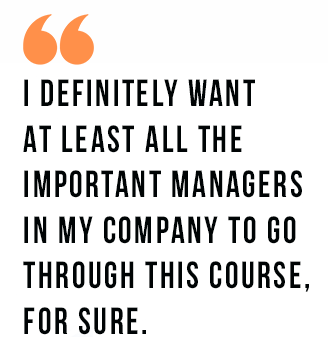
[DM] So who else would you recommend the Scaling Up methodology to?
[VB] Well, my organization has about 130 people. I think that’s the sweet spot of which the Scaling Up customers should be. Like mid-size, mid-volume. We are not a big company that needs McKinsey or Boston Consulting Group.
But at the same time, we need someone who can speak with experience. Someone who I can relate to with the challenges
I face.
If that’s where you are, then this is the kind of course for you.
I think it hits the sweet spot for mid-market organizations because as a mid-sized company ourselves, the problems that Scaling up addresses are something I can immediately relate to.
I also think it’s good for anyone who is starting a business. Like, entrepreneurs or organizations that want to grow and get into the big numbers, but they are kind of stuck on what should be the next step.
[DM] Well, thank you so much for your time, Vikram. I really enjoyed getting to hear your thoughts on all this.
Transform Your Organization Into
a Scaling Up Machine
Scaling Up Master Business Course is the result of collaboration between Verne Harnish and Growth Institute.
It was designed to help you effectively implement the famous Scaling Up methodology step by step under the guidance of Verne Harnish & Scale Up Coaches with the added support of a peer mastermind group.
This is the only online course that Verne Harnish teaches.
Registration for the next cohort of Scaling Up Master Business Course is open year-round!
But each cohort is limited to 75 selected leaders (or teams).
Sign up here now before registration closes.

